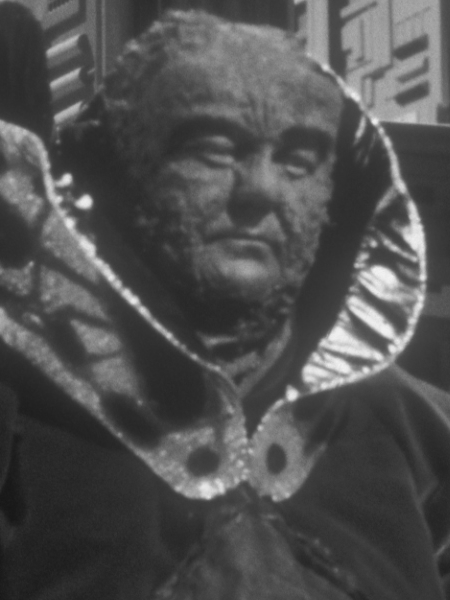Stratford Johns
| Acting Credits | ||
|---|---|---|
| 4 credits in 1 entry |  | |

(this image appears for illustrative purposes only and no attempt is made to supersede any copyright attributed to it)
Alan Edgar Stratford-Johns
Born: Tuesday 22nd September 1925Died: Tuesday 29th January 2002 (age: 76)
Stratford Johns, was a popular British stage, film and television actor who is best remembered for his starring role as Detective Inspector Charlie Barlow in the long-running BBC police series Z-Cars.
He played Monach in the 1982 story Four to Doomsday.
Johns was born in Pietermaritzburg and grew up in South Africa, where his parents had emigrated. After serving in the South African navy during World War II, Johns worked for a time in accountancy, but soon became involved in amateur theatre.
In 1948, he bought a one-way ticket to Britain and learned his craft working in repertory theatre at Southend-on-Sea for almost five years. He began to appear in British films from the mid-1950s, including a role in the classic Ealing comedy The Ladykillers (1955).
He ran a small hotel in London during the 1950s, and was a member of the English Stage Company at the Royal Court Theatre during the Angry Young Men period when new playwrights, including John Osborne, introduced new themes to British theatre. His most famous character, Barlow, was noted for his hard edges, owing much to the changes in characterisation pioneered at the Royal Court.
In 1962 he won the part of Barlow in Z-Cars and soon became one of the most familiar and popular faces on British television. During the long run (1962–1965) of Z-Cars, he transferred his character to the spin-off series, Softly, Softly (1966–1969), and later Softly, Softly: Taskforce (1969–1972). He also played the voice of the mysterious "Guvner" in The Great St Trinian's Train Robbery (1966).
In the 1970s he starred in a third spin-off series, Barlow at Large (1971,1973), which saw the character transferred to British Intelligence: it was later retitled simply Barlow (1974–1975). Although the Barlow character remained popular (and appeared in another spin-off, in which he investigated the Jack The Ripper murders), ratings for these solo spin-offs declined, and the final series ended in 1975. Barlow was seen once more in 1976, in the series Second Verdict.
Johns appeared as President of the Council Bradshaw in the 1970 award-winning film "Cromwell" with Richard Harris in the role of Cromwell and Sir Alec Guinness as King Charles 1st.
In 1973 Johns was named BBC TV Personality of the Year by the Variety Club of Great Britain. He also landed a cameo role as the apartheid-supporting Namib mine superintendent Zimmerman in the mini-series Master of the Game, although he went uncredited for the role.
Johns later appeared in the much-maligned Ken Russell films Salome's Last Dance and The Lair of the White Worm (both 1988), followed by the title-character in the mid-1980s Channel 4 series Brond.
His many stage credits include Daddy Warbucks in the original West End run of Annie - he can be heard on the original London cast album - and the Ghost of Christmas Present in the original Birmingham cast of the stage adaptation of the film musical Scrooge (1970), on the recording of which he can also be heard. His guest appearances on TV include The Avengers, Department S, Neverwhere, the Doctor Who serial Four to Doomsday (1982) and the Blake's 7 episode "Games". He had a prominent role as Calpurnius Piso in the BBC's acclaimed adaptation of Robert Graves' I, Claudius (1976); he played Magwich in the BBC's 1981 adaptation of Dickens' Great Expectations, and the jailer in The Secret Life of Albie Sachs. In 1993, Johns appeared in the BBC period drama Scarlet and Black alongside a young Ewan McGregor and Rachel Weisz.
He was also the author of the children's book Gumphlumph; in the mid-1960s, at the height of his fame as Barlow, he read it on the children's television series Jackanory. Gumphlumph would be revived, again with Johns narrating, for the TV-am children's programme Rub-A-Dub-Tub in the 1980s.


 Home Region:
Home Region:
